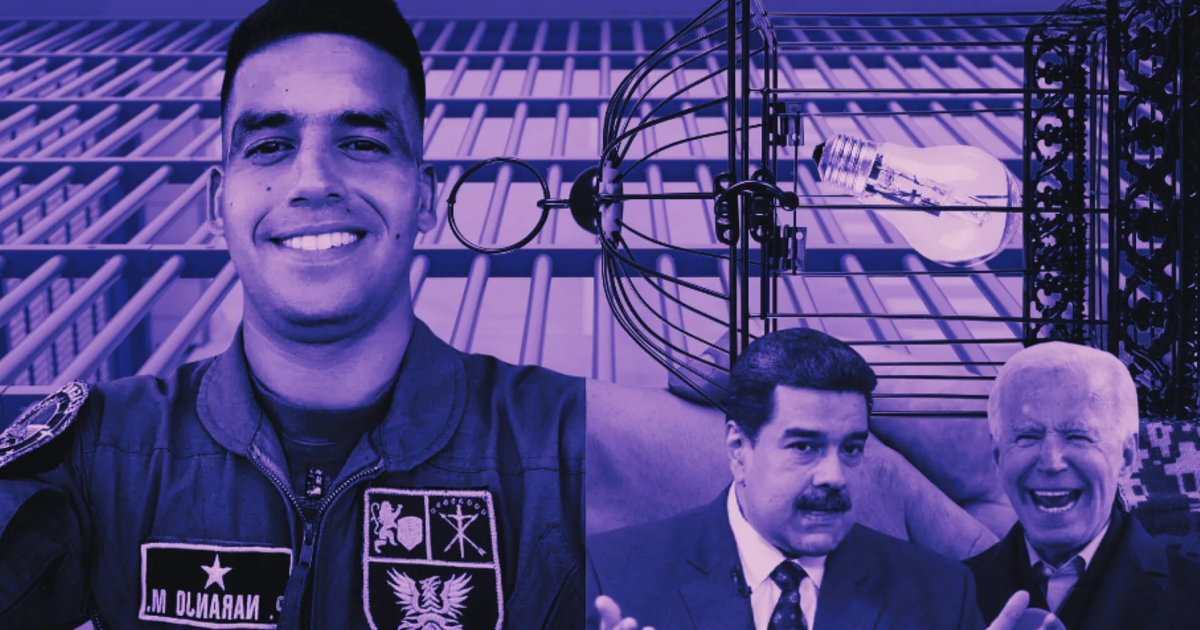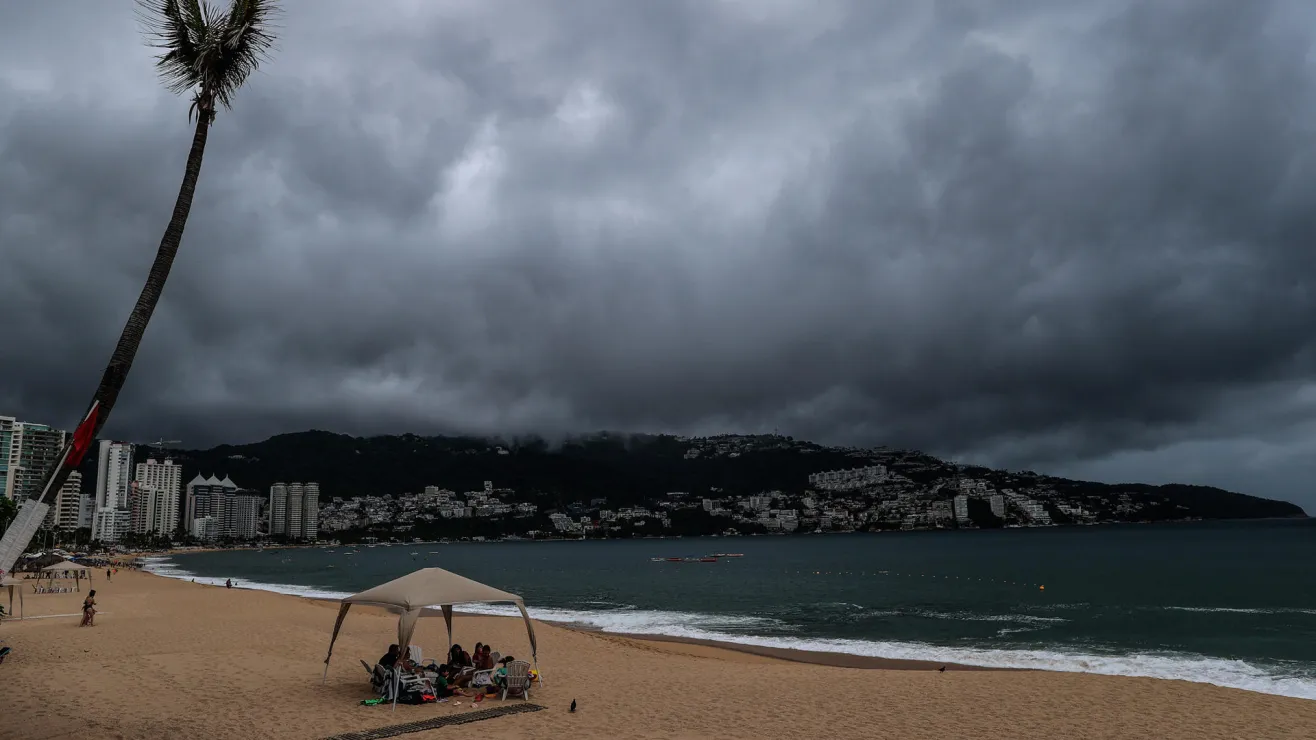Both he and his father fled together to the United States and requested asylum, for fear of being imprisoned by the dictatorship of Nicolás Maduro, in Venezuela, upon defecting.
The Ramo Verde prison is the feared military prison of Chavismo, where many Venezuelans have been “tortured” for political reasons, and now Lieutenant Naranjo is there, after “the Biden administration used the young Naranjo as a bargaining chip for its agreement with madurism,” reported the news portal El Nuevo Conservador.
“We never had a plan B,” Naranjo Sr. said in a phone interview from Houston. He was released after 10 days in US custody and is now awaiting the outcome of his own asylum application. “We never thought that the United States, as an ally of democracy in the world and of the Venezuelan opposition, as a country that protects human rights and freedoms, could do what it did with my son.”
Deportation
The resumption of deportation flights from the United States to Venezuela for the first time in years — 10 since October, according to Witness at the Border, an advocacy group that tracks flight data — has failed to stop the increase. More than 85,000 were arrested crossing the border illegally in October and November, the second highest nationality after Mexicans.
Little is known about what happens to deportees once they are returned to their country. However, critics and members of the Venezuelan exile community in South Florida have criticized the Biden administration for overlooking the serious dangers faced by deportees like Naranjo’s case.
Last week, a group calling itself Independent Venezuelan American Citizens joined Republican Congressman Carlos Jimenez from Miami to denounce the deportation and subsequent arrest of Naranjo Jr. at the hands of Maduro. He said he sent a request to the White House on Dec. 12 seeking to block the deportation, but received no response. On December 14, after failing to reverse a deportation order issued by an asylum officer, Naranjo Jr. was deported, according to his father.
Ernesto Ackerman, a member of the group, declared that deportation was the equivalent of sending an American drug agent into the hands of a drug cartel.
Naranjo’s deportation comes in the context of the United States’ attempts to improve relations with the Maduro dictatorship, after the Donald Trump government’s “maximum pressure” campaign failed to overthrow Maduro. In November, the White House eased oil sanctions on the OPEC nation to support nascent negotiations between Maduro and his opponents over guarantees for next year’s presidential elections.
Presidential pardon
Last week, Biden announced a presidential pardon to release from prison Maduro’s alleged figurehead, Alex Saab, detained for more than three years accused of money laundering in the United States.
Neither the White House nor U.S. Immigration and Customs Enforcement commented on the Naranjos’ situation.
The father-son saga began in 2018, when General Naranjo was arrested along with a handful of other officers for allegedly plotting to assassinate Maduro, sow chaos and disrupt Venezuela’s presidential election that year. Naranjo denies his involvement in a barracks uprising dubbed “Operation Armageddon” by Maduro, but he was still subjected to a military tribunal, along with other alleged conspirators, on charges including rebellion and treason.
In 2021, in the midst of the coronavirus pandemic, Naranjo was hospitalized after suffering a stroke in prison. Under international pressure from Maduro’s opponents, including the head of the Organization of American States, he was allowed to complete his sentence at home.
When the regime decided to extend the sentence of his co-defendants, he feared that the house arrest order would be revoked and that he would be imprisoned again. He decided to flee at the end of 2022, and his son, who he claims never conspired against Maduro, joined him to ensure he arrived safely.
“His only crime was being a good son,” said María Elena Machado, who has seen her son in prison twice since his return.
The two first crossed the border into Colombia, home to more than 4 million Venezuelans who have fled their homes since 2016. But with a pro-government ally of Maduro in power and Marxist rebels still lurking in the countryside, both felt unsafe, So they decided to undertake the dangerous journey on foot through the Darien jungle to the United States. On October 4, they crossed the Rio Grande (Grande) near Brownsville, Texas, and surrendered to the United States Border Patrol.
Crossing illegally from Mexico exposed the Naranjos to stricter standards for passing initial asylum screenings.
A rule introduced in May applies the higher standard to anyone who crosses the border illegally after passing through another country, such as Mexico, without seeking protection there. Migrants must also use one of the Biden administration’s new legal avenues for asylum, such as a new mobile app for appointments at official crossings.
It is unclear why Naranjo Jr.’s asylum request was rejected. His father said he appealed the asylum officer’s initial determination that he would not face retaliation if he was returned to Venezuela before a federal immigration judge in Pearsall, Texas, but lost.
Naranjo Jr. did not have a lawyer throughout the process, according to his father. Asylum seekers have the right to call their lawyers before screening interviews, but many advocates complain that detainees receive little notice, often during non-working hours, and cannot find help.
Venezuelans who pass the selection do relatively well before immigration judges. Its asylum granting rate was 72% in the government’s fiscal year that ended Sept. 30, compared with 52% for all nationalities, according to Syracuse University’s Transactional Records Access Information Office.
Upon his arrival in Venezuela, Naranjo Jr. was detained again on charges of desertion. He is now being held in the military prison on the outskirts of Caracas along with several opponents of the regime.
Meanwhile, migration experts warn that other Venezuelans deserving asylum could suffer the same fate.
“This is not a surprise,” Julio Henríquez, a Venezuelan-born immigration lawyer, said in Boston. “It was bound to happen at some point.”
Source: With information from AP and El Nuevo Conservador






